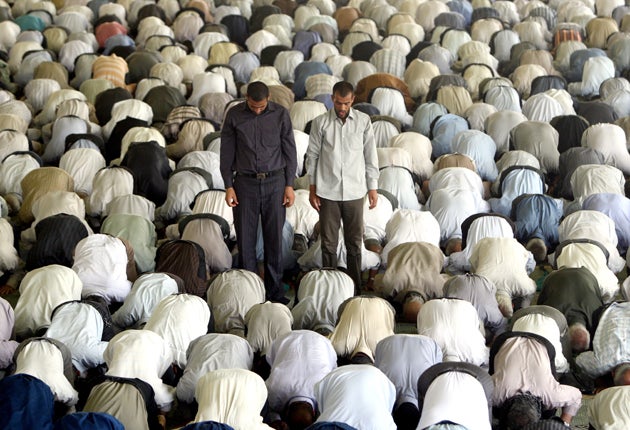British embassy staff to stand trial over protests
Cleric's threat prompts EU backlash and warning that ambassadors may be recalled in retaliation / British Government blamed for post-election bloodshed and accused of inciting ‘velvet revolution’

A leading Iranian cleric sharply and unexpectedly raised the temperature in the crisis over the detention of British embassy staff yesterday by announcing that the two employees still being held would be forced to stand trial for inciting post-election violence against the Islamic regime.
The threat prompted a coordinated European Union protest to Iran and a warning that all EU member states may recall their ambassadors in retaliation.
Ayatollah Ahmad Jannati used Friday prayers to tell worshippers that the individuals in question had "made confessions". Discussing the unrest which followed the disputed 12 June presidential elections he added: "In these events their embassy had a presence. Some people were arrested. Well, naturally, they will be put on trial". Britain he went on, had "designed" a velvet revolution. "After the election, the enemy could not stand peoples joy. The enemy tried to poison the people. They had planned a velvet revolution before the election." He cited warnings from the British Foreign Office as long ago as March that "street riots" were likely around the election as evidence that it was involved in promoting them.
The British government was left scrambling to decipher developments as the surprise statement contradicted conciliatory signals filtering out of Iran earlier in the week which had given hope that at least one of the two remaining staff would be freed today. The Foreign Secretary David Miliband said he was "deeply concerned" and was seeking urgent clarification from Iran.
The Iranian ambassador to the UK was summoned to explain what if any charges were being brought against the staff. Britain has repeatedly denied claims by the Iranian government that it played an active role in fomenting the biggest protests seen in the country since the 1979 Islamic Revolution. "We are confident that our staff have not engaged in any improper or illegal behaviour," Mr Miliband said.
The hardliner Ayatollah Jannati has no role in the Interior or Foreign ministries and so theoretically has no influence over any decision to bring charges. Some analysts said his remarks may have been an example of the habitual crowd-pleasing Friday sermonising that leading figures in the Iranian regime are given to.
But Mr Jannati is chairman of the Guardian Council, the powerful 12-man clerical body that vets legislation passed by the Iranian parliament, and is close to the supreme spiritual leader Ayatollah Ali Khamenei. On Monday the Guardian Council gave its seal of approval to the landslide victory claimed by President Mahmoud Ahmadinejad.
If borne out, the threat of a trial would mark a dangerous escalation in the current row. "We are extremely concerned, this could go very much in the wrong direction", said one British official. It could also blow a bilateral dispute with Britain, regarded in Iran with deep suspicion for what Tehran regards as its post-colonial meddling in the Middle East, into a full-scale diplomatic crisis between Iran and the EU.
Under pressure from Britain, the other 26 EU governments agreed to summon Iranian ambassadors in their capitals in a coordinated protest at Tehran's conduct. They also warned Tehran yesterday that there is no question of "business as usual" and that the issuance of visas for Iranian officials would be restricted as long as the embassy staff were being held. Frank Belfrage, secretary of state for foreign affairs of Sweden, which holds the rotating EU presidency, told the Iranian ambassador: "We demand that Iran immediately release the locally engaged staff who are being detained. If this does not occur the EU will take action".
Germany and Italy are still opposing Britain's proposals for the collective recall of all EU ambassadors but yesterday's escalation of the stand-off may inevitably lead to this, diplomats said. The matter of how to react to the Iran crisis will also dominate the G8 summit in Italy next week. "This threat has really focused minds," said one EU source. France was quick to promise full support for Britain. President Nicolas Sarkozy said he was willing to toughen sanctions to show Iranian leaders "that the path they have chosen is a dead end". French solidarity with Britain he added was "total".
Britain is however nervous about engaging in megaphone diplomacy that would give Tehran reason to accuse it of "hostile acts" which was the pattern that officials admit played out during the crisis over the seizure by Iranian Revolutionary Guards of 15 Royal Navy personnel in 2007.
Seven of the nine staff originally detained last month have been released but the remaining two are being held at an undisclosed location. They are believed to have access to lawyers but the Foreign Office has been given no indication as to any specific charges.
Join our commenting forum
Join thought-provoking conversations, follow other Independent readers and see their replies
Comments
Bookmark popover
Removed from bookmarks